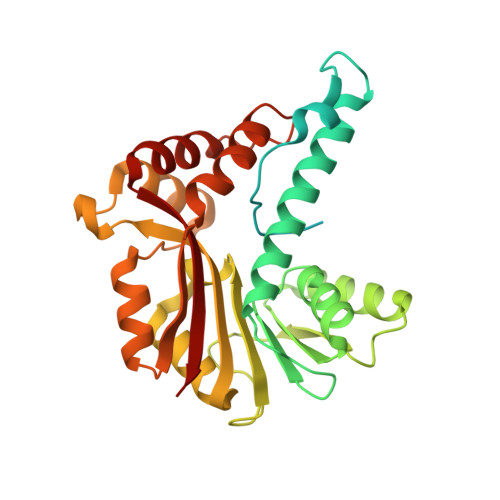Structure analysis of geranyl pyrophosphate methyltransferase and the proposed reaction mechanism of SAM-dependent C-methylation
Ariyawutthiphan, O., Ose, T., Minami, A., Sinde, S., Tsuda, M., Gao, Y.-G., Yao, M., Oikawa, H., Tanaka, I.(2012) Acta Crystallogr D Biol Crystallogr 68: 1558-1569
- PubMed: 23090405
- DOI: https://doi.org/10.1107/S0907444912038486
- Primary Citation of Related Structures:
4F84, 4F85, 4F86 - PubMed Abstract:
In the typical isoprenoid-biosynthesis pathway, condensation of the universal C(5)-unit precursors isopentenyl pyrophosphate (IPP) and dimethylallyl pyrophosphate (DMAPP) occurs via the common intermediates prenyl pyrophosphates (C(10)-C(20)). The diversity of isoprenoids reflects differences in chain length, cyclization and further additional modification after cyclization. In contrast, the biosynthesis of 2-methylisonorneol (2-MIB), which is responsible for taste and odour problems in drinking water, is unique in that it primes the enzymatic methylation of geranyl pyrophosphate (GPP) before cyclization, which is catalyzed by an S-adenosyl-L-methionine-dependent methyltransferase (GPPMT). The substrate of GPPMT contains a nonconjugated olefin and the reaction mechanism is expected to be similar to that of the steroid methyltransferase (SMT) family. Here, structural analysis of GPPMT in complex with its cofactor and substrate revealed the mechanisms of substrate recognition and possible enzymatic reaction. Using the structures of these complexes, methyl-group transfer and the subsequent proton-abstraction mechanism are discussed. GPPMT and SMTs contain a conserved glutamate residue that is likely to play a role as a general base. Comparison with the reaction mechanism of the mycolic acid cyclopropane synthase (MACS) family also supports this result. This enzyme represented here is the first model of the enzymatic C-methylation of a nonconjugated olefin in the isoprenoid-biosynthesis pathway. In addition, an elaborate system to avoid methylation of incorrect substrates is proposed.
Organizational Affiliation:
Graduate School of Life Sciences, Hokkaido University, Sapporo 060-0810, Japan.














